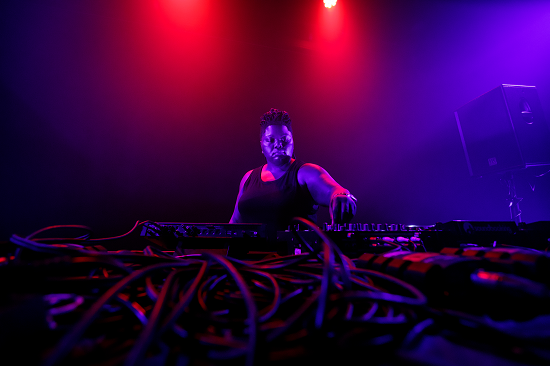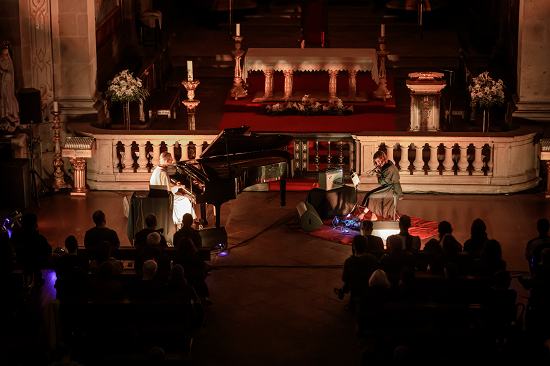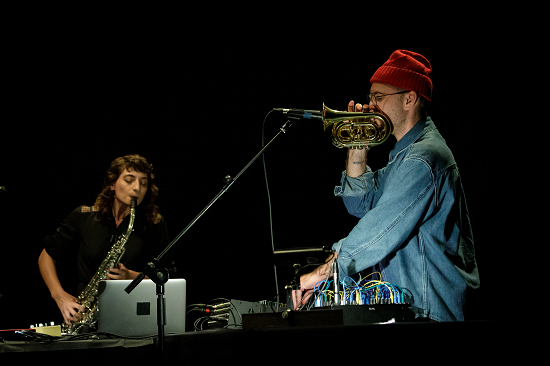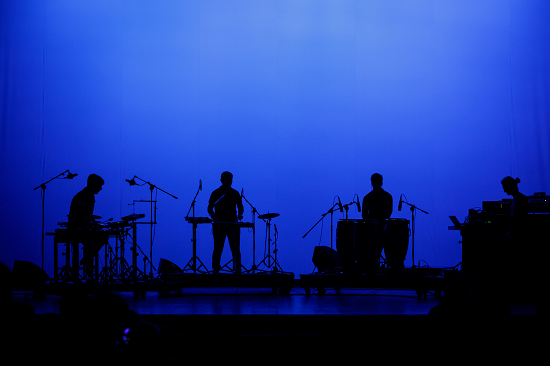Drumming GP and Burnt Friedman, photos by Adriano Ferreira Borges / Semibreve
Time advances unevenly depending on how it’s filled. Looking at a rolling news feed weighs down each moment but also makes the hours vanish. One person’s 44-day stint as prime minister can seem like it lasted a lifetime or was over in a second. The ways we perceive duration have a close relationship to sound, and this slippery qualitative aspect of time keeps coming to the surface throughout the 2022 edition of the Semibreve Festival in Braga, Portugal.
It’s most potent when Bleid brings Friday to a close. The Lisbon-based artist drops a wall of solid, multi-coloured techno where kicks are incessant but never pummelling. Midway through, a filter drop briefly rips out all the bass, and feels like it takes the floor of the venue with it. The ferocious energy that propels her single from earlier this year, ‘Beauty Brains Blend Tempo’ and her 2017 self-titled tape, is here in abundance, and it never lets up.
The BPMs of Bleid’s set aren’t that fast, but everything on top, from vocal samples to percussion, charges it with urgency. She operates directly on the heart rate, forcing movement in a way where we can’t help but become more intimately connected with our corporeality, more conscious of our bodies and those around us. It’s a set which is gleefully paradoxical – monolithic yet ever-changing. It saturates the mind and body with sensation, at its most potent making it impossible to feel anything outside the moment.
The following night, DJ Marfox rounds off a showcase from Lisbon’s consistently fascinating Príncipe label. It’s a fitting end given, as is explained in a panel discussion earlier in the day, DJ Marfox was the first artist signed to the label, galvanising their strive to challenge Portugal’s colonial history by giving a platform to artists and music whose heritage descends from the country’s former colonies; raised in Lisbon, DJ Marfox’s parents are from São Tomé and Príncipe. His 2011 EP, Eu Sei Quem Sou (I Know Who I am), still sounds decades ahead of its time, blending kuduro rhythms through a drum machine frenzy. His set sucks the room into a similar liberating headspace. Where Bleid has fierce directness, DJ Marfox’s beats are a polyrhythmic tapestry. Their intricacy pulls the dancefloor into a sway before, about 30 mins in, the BPM hits a vertiginous rise and all hell breaks loose.
Another Lisbon-based artist, working in vastly different terrain to Bleid and DJ Marfox, manages to conjure a similarly distorting effect of time and speed. David Maranha plays earlier on Friday evening, in the basement auditorium of the Theatro Circo. Active since the 1980s, Maranha’s music, both with his long-running project Osso Exótico and as a solo composer, has parallels with the likes of Tony Conrad or Charlemagne Palestine. It’s adjacent to minimalism, but it’s a kind of low minimalism, filled with rough edges and jagged tessellations.

Bleid
For Semibreve, he huddles over a rickety looking small organ and a mysterious white box, a massive bass stack looming in the distance. Beginning gently on the organ’s keys, he quickly erects an immense slab of drone. Flicking effects switches causes this suspended sonic mass to start fluctuating, bursts of high end, abrupt swells of floor shacking low. The result is a disorientating paradox. In the unmoving frame of the sustained notes Maranha triggers constant change. By freezing tones he makes them active, but this isn’t some gentle sound bath or sleek sonic think piece. It’s temperamental, ragged and borderline violent in its bends and cracks. Seizing the moment rather than letting it pass by unnoticed.
Something strange starts to happen when you’re experiencing music of such extremes so close together. You start to question how different they really are. This is not to say people are going to start dancing en masse to a drone set, or sipping whisky to lightspeed kuduro bangers. Rather, it highlights something more nuanced in Semibreve’s curation than just sticking together a hodgepodge of genres and touring acts. These disparate sounds made by artists from diverse backgrounds feels conversational. So many of the performances explode the ways we can experience the moment. Suggesting the seconds can be filled with something other than algorithmically determined distractions.
The festival’s program is split between sit down concert hall performances and a straight up dance program. Sequenced so closely, a blurring effect takes place. Crossovers start to appear where you never thought they would. It reorients your ears, making the mindboggling experimentation hidden in so much dance music slip to the surface, and the viscerality in drones, ambience and intricate electro-acoustic music feel more tangible.
Like Bleid, Stephen O’Malley and François J. Bonnet, who play in the main room of Theatro Circo on Friday, act directly on the audience’s pulse rate. Where several artists this weekend go heavy on the smoke machine, the duo know that a more natural diffusion carries greater weight. So much so, that the first few minutes are spent with the Sunn O))) guitarist lighting incense on the stage. It’s deliberate, gently paced gesture, a movement which isn’t superfluous but integral to the slow ritual that unfolds.
Spooky textures eventually solidify into a lulling dread reminiscent of Music For Nitrous Oxide era Stars Of The Lid. There’s more space, and more dynamic room in O’Malley and Bonnet’s performance compared to the claustrophobic Cyclene which the duo released in 2018, and it affords individual sounds greater weight. Case in point, midway through one of them summons a noise from their guitar which could be the abyssal groan of a whale that’s inhaled a church organ. So carefully paced, it knocks the whole performance into an eerie reverie, culminating in a stoned riff that doesn’t so much drop as seep in from the ether.

Jana Rush
Chicago’s Jana Rush’s set goes deep into footwork’s time-bypassing euphoria. The genre’s power, I think, is in how it merges frame rates rather than pure pace. The way it collides the fast and the slow into one burst of pure kinesis. Rush is a master of the craft here, and her set is a potent reminder of just how far she’s twisted and expanded Footwork’s framework without ever losing a grip on the joy integral to the tradition. Layers of rhythm twist into each other, as if she’s testing the amount of information that can occur in a single second. Hard beats drift apart, collapsing into something which fills intimately connected to dub in terms of negative space, if not directly in texture. Even a technical glitch can’t disrupt her set’s momentum. Indeed, it even adds a certain poetry. A sample chanting “work, work, work” builds over a shuffling groove before abruptly halted by the technical gremlin. Rush calmly checks her gear, fixes the problem, and immediately picks up where she left off, that “work, work, work” commencing once again.
The diverse threads of the festival’s lineup come closest to converging in the closing set, a specially commissioned collaboration between Porto-based percussion ensemble Drumming GP and Burnt Friedman. Sparse synths, pulsing textures and at one point a muffled funk bassline from Friedman get morphed through the Portuguese trio’s xylophones, congas and other percussion. The polyrhythmic interactions create a serene hypnosis, the extended jams moving in and out of shape in a peculiar, slinky-like motion. It’s an endless groove which, at its best slips out of any sense of pulse and becomes a hovering mass of pure rhythm and texture. It’s propulsive, but has an intricacy which demands careful contemplation.
A big part of what makes Semibreve special is the way the festival spills into and across the city itself. In a sense, it’s as much an architecture festival as a music one. Although the gorgeous Theatro Circo and the gorgeously dark Black Box host most shows, churches and museums through the city become sites for music and conversations they almost certainly weren’t designed to host. Semibreve gives you a distinct lens on the city. Politely introducing you to a space and then twisting expectations of how it should be used. It’s not that unusual for a city-based festival to take in unusual venues, but Semibreve doesn’t seem like it’s just for the sake of a novelty setting. These places become spaces artists can gently reshape.

Felicia Atkinson and Violeta Azevedo
The festival opens on Thursday at Santuário Do Bom Jesus Do Monte, a truly epic church atop a hill overlooking the city. It’s ornate and cavernous, but Felicia Atkinson and Violeta Azevedo don’t slip into trying to fill the space, to wrestle with its potential as a tool of amplification. Rather, their set hushes it. Azevedo begins with effects-laden flute. At the start whistling overtones give the impression she’s being doubled by a theremin. From there it twists through ghostly drones, and veers into animalistic textures. Atkinson joins in gradually, beginning with piano before adding in glassy tones, scratchy field recordings, and finally, sanguine fragments of speech. They suck our attention in rather than washing through the room in the hope we’ll notice.
Their collaboration, another commissioned by Semibreve, is a remarkable exercise in using sound to shrink a building. As they end Azevedo plays unaccompanied, making miniscule wobbles on the flute’s reed. Moments after she stops, the doors at the back of the church are flung open revealing a panorama of the city. It’s a moment of distorting perspectives that’s probably a procedural coincidence but feels like it could have been choreographed.
The hijacking of space comes across potently in Maxwell Sterling’s A/V collaboration with Stephen MacLaughlin in Theatro Circo. Sterling switches from bowed cello into a bizarre architecture of morphing rhythms. Patterns of beats and harmony make maze like grids, veering into something between medieval music and IDM, interspersed with fragments of spoken word, sampled from works of Leslie Winer. Vibrant and intricate, Sterling’s music comes close to ornate, but a hyperactive energy constantly diverts it towards something far more ecstatic and immersive.
McLaughlin’s visuals are intensely present. They’re a clear actor in proceedings rather than wallpaper to the sounds. Shots from horror films blend into melting iPhones, mind-boggling collages erupt and shatter, flooding your eyes with visual data. Unapologetically brazen and surreal, they, like Sterling’s music, sit in a strange relationship with the elaborate columns and stuccos of the Theatro Circo. As if the duo are, through sheer force, trying to overlay the building’s splendor with the digital uncanny. It’s a set which finds something euphoric in overstimulation, triggering a strange serenity by saturating every moment with a deluge of sensory information.

Lea Bertucci and Ben Vida
Some of Semibreve 2022’s most powerful moments are the most delicate. One of the most striking sets of the festival, and no doubt the most disarming, comes from Lea Bertucci and Ben Vida. Loosely connected to their collaboration from earlier this year, Murmurations, it takes the album’s sense of mischief to new levels. The pair begin in a conversation, but it’s so babbled by effects that specifics like the actual words disappear. It’s reminiscent of sound poetry, the linguistic deconstruction assisted by technology rather than in the words themselves. Gentle pulses come from Vida’s modular, somehow adding to the absurdity rather than taming it.
Vida and Bertucci both excel at intricate, beautiful minimalism. Here, their collaboration toys with any expectation of what they’d do combined, but it never feels like they’re poking fun at the audience. Although the performance is delivered with total conviction, there’s a playful humour throughout, and a theatricality which makes it hard to tell if it’s improvised or intensely rehearsed. It’s warm hearted, joyful, and carried along by a very human sense of awkwardness. It feels inherently social, about the miracle of communication and the potential in misunderstandings, perhaps. Experimental music doesn’t need to be conjuring immense abstractions all the time, Vida and Bertucci show that it can be just as evocative when it plays with something utterly everyday.
Jan Jelinek brings a similar playfulness to the festival’s closing day, performing in the middle of the audience in the Salão Medieval Da Reitoria Da Universidade Do Minho. Strikingly subtle, his set creates an intriguingly narrativeless sound world, a montage where sonic events are held up for contemplation as objects in themselves before passing onto something else. Beginning with clicks, clangs and rustles, it slowly moves towards more melodic shapes, settling into a looping sway that echoes the lop-sided hauntological drift of his 2001 album Loop Finding Jazz Records. The wonkiness feels at odds with the regal venue the sounds are being diffused in. But this tension is a strength rather than a failing.


